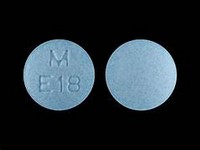metformin hydrochloride

CLINICAL USE
Non-insulin dependent diabetes mellitus Polycystic ovary syndromeDOSE IN NORMAL RENAL FUNCTION
500 mg 3 times a day; maximum 2 g daily in divided dosesPolycystic ovary syndrome: 1.5–1.7 g daily in 2–3 divided dosesPHARMACOKINETICS
DOSE IN RENAL IMPAIRMENT
GFR (mL/MIN)
40–50 25–50% of dose10–40 25% of dose. See ‘Other Information’DOSE IN PATIENTS UNDERGOING RENAL REPLACEMENT THERAPIES
IMPORTANT DRUG INTERACTIONS
Potentially hazardous interactions with other drugsADMINISTRATION
Reconstition
–Route
OralRate of Administration
–Comments
–OTHER INFORMATION
Lactic acidosis is a rare but serious metabolic complication that can occur due to metformin accumulation. Reported cases have occurred primarily in diabetic patients with significant renal impairmentAs metformin is renally excreted eGFR values should be determined before initiating treatment and regularly thereafter:at least annually in patients with —normal renal functionat least 2–4 times a year in patients —with an eGFR at the lower limit of normal and in elderly subjectsSpecial caution should be exercised in the elderly in situations where renal function may become impaired, e.g. initiating therapy with antihypertensives, diuretics
See how to identify renal failure stages according to GFR calculation
See how to diagnose irreversible renal disease
Home








